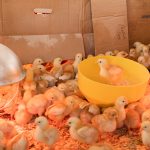Lice are small, wingless insects that can infest chickens and cause various health problems. Two main types of lice affect chickens: biting lice and sucking lice. Biting lice consume the chicken’s skin and feathers, resulting in irritation, feather damage, and potentially anemia in severe cases.
Sucking lice feed on the chicken’s blood, leading to anemia, weakness, and reduced egg production. Both types of lice cause significant discomfort and stress to affected chickens, resulting in decreased overall health and productivity. Lice infestations can rapidly spread within a flock, particularly in crowded or unsanitary conditions.
Once a chicken is infested, complete eradication of lice can be challenging, emphasizing the importance of prevention and early detection. Regular health checks and preventative measures are crucial for maintaining flock well-being and preventing lice infestations.
Table of Contents
- 1 Creating a Clean and Healthy Environment: Tips for Preventing Lice Infestations
- 2 Regular Health Checks: Monitoring and Treating Chickens for Lice
- 3 Natural Remedies: Using Herbs and Essential Oils to Keep Lice at Bay
- 4 Proper Nutrition: Feeding Chickens a Balanced Diet to Boost Immunity
- 5 Quarantine and Isolation: Preventing the Spread of Lice to Other Flocks
- 6 Seeking Professional Help: When to Call a Veterinarian for Lice Infestations
- 7 FAQs
- 7.1 What are lice and why are they a problem for chickens?
- 7.2 How can I prevent lice infestations in my chicken coop?
- 7.3 What are some natural remedies for keeping lice away from chickens?
- 7.4 Are there any commercial products available for lice control in chickens?
- 7.5 Can lice infestations in chickens be harmful to humans?
Key Takeaways
- Lice are small, wingless insects that can infest chickens and cause irritation and stress.
- Keeping the chicken coop clean and dry is essential for preventing lice infestations.
- Regularly check chickens for signs of lice infestations and treat promptly to prevent spread.
- Herbs and essential oils such as lavender and neem can be used to naturally repel lice from chickens.
- A balanced diet with proper nutrition can help boost chickens’ immunity against lice infestations.
Creating a Clean and Healthy Environment: Tips for Preventing Lice Infestations
Cleaning and Disinfecting
Regularly cleaning and disinfecting the chicken coop, nesting boxes, and roosting areas can help reduce the risk of lice infestations. Removing old bedding, droppings, and debris from the coop will eliminate potential hiding places for lice and other pests.
Providing a Healthy Environment
Additionally, providing ample ventilation and natural light in the coop can help deter lice infestations, as lice thrive in dark, damp environments.
Practicing Good Biosecurity
It’s also important to practice good biosecurity measures to prevent the introduction of lice to your flock. Quarantining new birds before introducing them to your existing flock can help prevent the spread of lice and other parasites. Regularly inspecting new birds for signs of lice or other pests before integrating them with your flock is essential for maintaining a healthy environment for your chickens.
Regular Health Checks: Monitoring and Treating Chickens for Lice

Regular health checks are crucial for monitoring and treating chickens for lice infestations. Inspecting your chickens for signs of lice, such as feather damage, irritation, or excessive scratching, can help you detect infestations early and take appropriate action. Additionally, checking for lice eggs (nits) at the base of the feathers can help you identify the presence of lice on your chickens.
If you suspect that your chickens are infested with lice, it’s essential to take immediate action to prevent the infestation from spreading. There are several treatment options available for lice infestations in chickens, including dusting powders, sprays, and shampoos specifically designed to eliminate lice. It’s important to follow the manufacturer’s instructions carefully when using these products to ensure the safety and effectiveness of the treatment.
In severe cases of lice infestations, it may be necessary to cull affected birds to prevent the spread of lice to the rest of the flock. Regular health checks and prompt treatment are essential for maintaining the overall health and well-being of your chickens and preventing the spread of lice infestations.
Natural Remedies: Using Herbs and Essential Oils to Keep Lice at Bay
In addition to conventional treatments, there are several natural remedies that can help keep lice at bay and promote the overall health of your flock. Herbs such as lavender, mint, and thyme have natural insect-repelling properties and can be used to deter lice in the chicken coop. Simply scattering these herbs in the nesting boxes or adding them to the bedding can help repel lice and other pests.
Essential oils such as tea tree oil, eucalyptus oil, and neem oil have also been found to be effective in controlling lice infestations in chickens. Diluting these essential oils with a carrier oil and applying them directly to the chicken’s feathers can help eliminate lice and soothe irritated skin. It’s important to use essential oils with caution and consult with a veterinarian or poultry expert before using them on your chickens.
Incorporating natural remedies into your regular coop maintenance routine can help reduce the risk of lice infestations and promote a healthy environment for your flock. However, it’s important to remember that natural remedies should not replace regular health checks and preventative measures for lice infestations.
Proper Nutrition: Feeding Chickens a Balanced Diet to Boost Immunity
Feeding your chickens a balanced diet is essential for boosting their immunity and resilience against lice infestations. A diet rich in high-quality protein, vitamins, and minerals can help support the overall health of your flock and reduce their susceptibility to pests and parasites. Providing access to fresh water, a balanced commercial feed, and supplemental treats such as fruits, vegetables, and mealworms can help ensure that your chickens receive the nutrients they need to maintain a strong immune system.
Incorporating natural supplements such as garlic, apple cider vinegar, and diatomaceous earth into your chicken’s diet can also help deter lice infestations. Garlic has natural antibacterial and antiparasitic properties that can help repel pests, while apple cider vinegar can help maintain a healthy pH balance in the chicken’s digestive system. Diatomaceous earth is a natural insecticide that can be added to the chicken’s dust bathing areas to help control lice infestations.
Providing a balanced diet and natural supplements can help support the overall health and well-being of your flock, reducing their susceptibility to lice infestations and other health issues. However, it’s important to consult with a poultry nutritionist or veterinarian to ensure that you are providing your chickens with a diet that meets their specific nutritional needs.
Quarantine and Isolation: Preventing the Spread of Lice to Other Flocks

Immediate Isolation of Infested Birds
If you suspect that one of your chickens is infested with lice, it’s essential to isolate the affected bird from the rest of the flock immediately. This will help prevent the spread of lice to other chickens while you treat the affected bird and disinfect the coop.
Quarantining New Birds
When introducing new birds to your flock, it’s vital to quarantine them for a period of time before allowing them to interact with your existing chickens. This will give you an opportunity to monitor the new birds for signs of lice or other pests before integrating them with your flock.
Maintaining Flock Health
Quarantine and isolation practices are essential for maintaining the health and well-being of your chickens and preventing the spread of lice infestations. By following these practices, you can ensure a healthy and thriving flock.
Seeking Professional Help: When to Call a Veterinarian for Lice Infestations
In some cases, lice infestations in chickens may require professional intervention from a veterinarian or poultry expert. If you have tried conventional treatments and natural remedies without success, or if you have a large-scale infestation that is difficult to manage on your own, it may be time to seek professional help. A veterinarian or poultry expert can provide guidance on effective treatment options for lice infestations in chickens and help you develop a comprehensive management plan for preventing future infestations.
They can also conduct diagnostic tests to confirm the presence of lice and rule out any underlying health issues that may be contributing to the infestation. Additionally, if you are unsure about how to properly administer treatments or if you have concerns about the safety of certain products, a veterinarian can provide valuable guidance and support. Seeking professional help when dealing with lice infestations in chickens can help ensure the health and well-being of your flock and prevent the spread of infestations to other birds.
In conclusion, lice infestations can pose a significant threat to the health and well-being of your flock. Understanding the threat of lice, implementing preventative measures, conducting regular health checks, using natural remedies, providing proper nutrition, practicing quarantine and isolation, and seeking professional help when necessary are all essential components of managing lice infestations in chickens. By taking proactive steps to prevent and treat lice infestations, you can help maintain a clean and healthy environment for your flock and promote their overall health and productivity.
If you’re looking for ways to keep lice away from your chickens, you may also be interested in learning about how to design a chicken coop that helps prevent pests. Check out this article on chicken coop trampoline for innovative ideas on creating a coop that keeps your chickens healthy and pest-free.
FAQs
What are lice and why are they a problem for chickens?
Lice are small, wingless insects that can infest chickens and cause irritation, discomfort, and decreased egg production. They can also spread to other birds in the flock.
How can I prevent lice infestations in my chicken coop?
To prevent lice infestations, it’s important to keep the chicken coop clean and dry, regularly inspect the birds for signs of lice, and use dust baths and diatomaceous earth to control lice populations.
What are some natural remedies for keeping lice away from chickens?
Natural remedies for keeping lice away from chickens include using herbs such as lavender and mint, as well as essential oils like tea tree oil and eucalyptus oil. These can be added to dust baths or diluted and sprayed directly on the birds.
Are there any commercial products available for lice control in chickens?
Yes, there are commercial products such as poultry dust, sprays, and powders specifically designed to control lice in chickens. These products can be effective when used according to the manufacturer’s instructions.
Can lice infestations in chickens be harmful to humans?
While lice that infest chickens are not the same species that infest humans, it’s still important to practice good hygiene and avoid direct contact with infested birds to minimize the risk of any potential transmission to humans.
Meet Walter, the feathered-friend fanatic of Florida! Nestled in the sunshine state, Walter struts through life with his feathered companions, clucking his way to happiness. With a coop that’s fancier than a five-star hotel, he’s the Don Juan of the chicken world. When he’s not teaching his hens to do the cha-cha, you’ll find him in a heated debate with his prized rooster, Sir Clucks-a-Lot. Walter’s poultry passion is no yolk; he’s the sunny-side-up guy you never knew you needed in your flock of friends!







